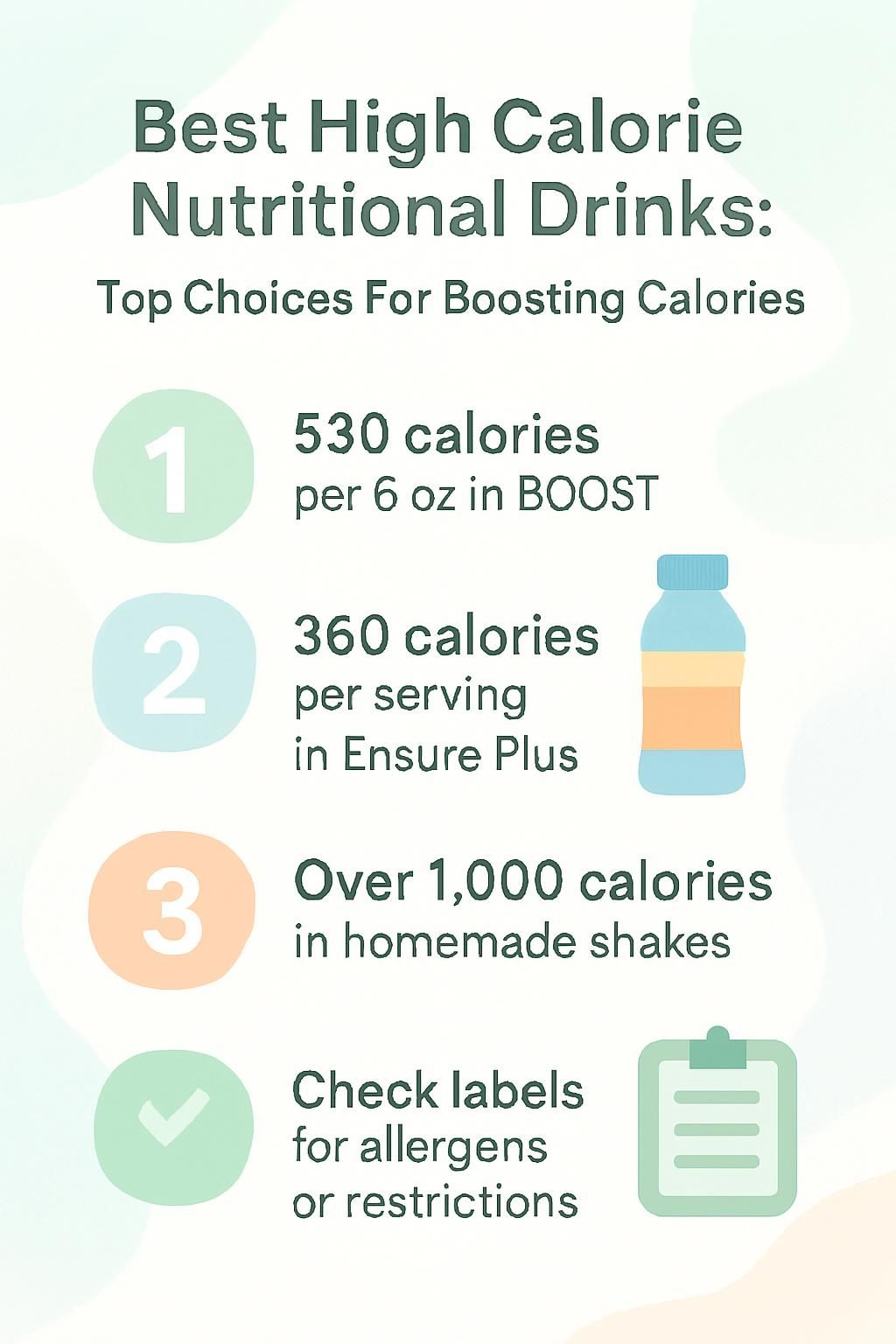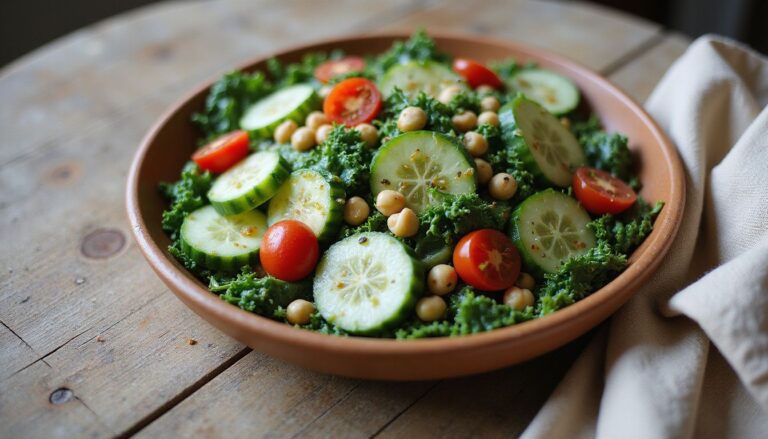Best High Calorie Nutritional Drinks: Top Choices For Boosting Calories
Our Nutrition Assistant AI Suite will transform your body. You will lose fat, get toned, and build muscle. Gain confidence and optimal health.
If you have trouble gaining or keeping weight, high calorie drinks can help fill the gap. Many high calorie nutritional drinks pack energy, protein, and key micronutrients into a small bottle, which makes them easy to use on busy days.
For example, BOOST® Very High Calorie gives 530 calories per 8 fl oz serving and 22 grams of protein. In this guide, you will learn how to choose smart options, compare labels, and make simple recipes that raise your calorie intake without a lot of prep.
Key Takeaways
- BOOST Very High Calorie delivers 530 calories and 22 g protein per 8 oz, one of the most energy-dense choices from major brands.
- Ensure Plus provides 360 calories and at least 13 g protein per serving, supporting healthy weight gain during recovery.
- Homemade shakes can exceed store-bought calories. A peanut butter banana smoothie can top 1,000 calories per glass.
- Check allergen lists for milk, soy, or other triggers. Some drinks are lactose free but still not safe for conditions like galactosemia.
- Talk with your clinician if you have complex medical needs or special diets before starting any dietary supplement plan.

Understanding High-Calorie Nutritional Drinks

High-calorie nutritional drinks are ready-to-drink formulas or powders that concentrate energy, protein, and vitamins into a small serving. They support weight gain, steady energy, and, in some cases, meal replacement.
What Are High-Calorie Nutritional Drinks and Why Use Them?
These products deliver a lot of calories and protein in a short volume. One 8 fl oz bottle of BOOST® Very High Calorie provides 530 calories and 22 grams of protein, plus a broad mix of vitamins and minerals.
Many formulas supply at least 20 percent of the Daily Value for key nutrients like vitamin C, zinc, iron, calcium, thiamine, riboflavin, folic acid, and vitamin B12. This helps cover gaps when appetite is low or chewing is hard.
A single 8 fl oz bottle can provide over 500 calories and up to 22 grams of high-quality protein.
Healthcare teams often suggest these drinks for underweight adults or older adults at risk of malnutrition. Pleasant flavors, such as chocolate, vanilla, or strawberry, can make daily use easier as a snack or with a meal.
Some products are lactose free, which helps people with lactose intolerance. Others use a blend of milk proteins like casein, the main protein in milk, and soy protein isolate, a concentrated soy protein source.
How Can Increasing Calorie Intake Benefit You?
Raising calorie intake can help you maintain or gain weight, support recovery, and protect muscle. People who struggle with appetite due to stress, depression, or illness may need a calorie lift to meet daily needs.
BOOST VHC users often report steady weight gain across a case, in part because each serving offers 530 calories. Extra energy paired with high protein helps repair muscle after illness or training and can slow unwanted weight loss.
Many drinks include potassium, magnesium, iron, zinc, vitamin A, vitamin C, folate, and vitamin B12. These nutrients support immunity and tissue healing. Some patients with swallowing issues use thicker drinks, which can also help with safe medication timing under guidance.
Factors to Consider When Choosing High-Calorie Drinks
To find the right fit, compare calorie density, protein quality, and micronutrient coverage. Ingredient lists also matter, especially if you need to avoid certain allergens.
How Do You Evaluate Calorie Density in Drinks?
Look at calories per ounce. Drinks with higher calories per ounce are helpful if you are full fast or on fluid limits. For instance, BOOST VHC gives 530 calories in 8 ounces, a higher ratio than Resource Plus at 355 calories or Ensure Plus at 360 calories in similar servings.
Homemade shakes can go higher. A chocolate peanut butter shake can reach about 1,070 calories in one glass if you add whole milk and ice cream.
Pick higher calorie-per-ounce options if you must limit fluids, says registered dietitian Sarah White.
Fast food milkshakes often land near 340 to 400 calories. Calorie totals vary with ingredients like whole milk, syrups, added sugar, oils, or protein powders. Drinks that are mostly sugar and water add energy but few nutrients, so fortified options offer better nutrition value.
Why Is Protein Content Important in Nutritional Drinks?
Protein helps build and repair muscle, supports the immune system, and aids recovery. BOOST VHC includes 22 grams of protein per 8 ounces, which equals about 44 percent of the Daily Value.
Many calorie-dense shakes provide 13 to 22 grams of protein per serving from milk proteins or soy protein isolate. If you are rebuilding strength after illness or surgery, a higher protein level can help you meet daily goals.
Low-protein choices, like drinks heavy in sugars, may not support muscle needs. Pick a protein shake that matches your goals, such as recovery, weight gain, or strength.
Which Vitamins and Minerals Should You Look For?
Choose a high calorie nutritional drink with solid micronutrient coverage. BOOST® VHC lists 26 vitamins and minerals, including 12 mcg vitamin D, 60 mg vitamin C, and 5.5 mg zinc per serving, which support bone health and immunity.
Also scan for calcium near 250 mg, potassium around 420 to 450 mg, magnesium near 80 mg, and iron close to 6 mg per serving. B vitamins such as thiamine, riboflavin, niacin, pantothenic acid, biotin, choline, and folate fuel energy metabolism.
Some formulas use canola or soybean oil, which supply fats that help absorb fat-soluble vitamins like vitamin E, also called tocopherol. Trace minerals like selenium, chromium, iodine, and copper may appear too. These support metabolism and red blood cell production.
Once you know which micronutrients you want, check if any ingredients conflict with your diet or allergies.
How Do Dietary Restrictions Affect Your Drink Choices?
Diet rules shape your shopping list. If you have a milk allergy, avoid drinks with milk proteins such as casein or whey. BOOST Very High Calorie contains milk and soy, so it is not for those allergies.
People with lactose intolerance can often use BOOST VHC because it is lactose free, but it is not safe for galactosemia. Plant-based options may use almond, oat, or soy milk bases. If you react to soy, look for pea or rice protein instead of soy protein isolate.
Review labels for sweeteners, thickeners, and additives. Carrageenan, a thickener from seaweed, and certain sugar substitutes can bother sensitive stomachs. If your health is complex, ask your physician or dietitian before changing your plan.
Review of BOOST® Very High Calorie Nutritional Drink
BOOST® Very High Calorie is dense in energy and easy to sip. It can help you gain weight, maintain weight under stress, or meet goals during recovery.
What Is the Nutritional Profile and Key Features of BOOST®?
Each 8 fl oz bottle of BOOST® VHC provides 530 calories, 26 grams of fat, 22 grams of protein, and 52 grams of carbohydrates. Of those carbs, 13 grams are added sugars.
The drink includes 26 vitamins and minerals, such as vitamin D at 60 percent Daily Value, vitamin C at 70 percent, and calcium at 20 percent. Sodium sits near 290 mg. Cholesterol is about 5 mg per serving.
Core ingredients include water, glucose syrup for quick energy, canola oil for fats, casein from milk, and soy protein isolate for extra protein. You will find flavors like Very Vanilla, Chocolate, and Creamy Strawberry made with natural flavor.
It is shelf stable for about 18 months unopened. It tastes best chilled. You can buy single bottles or subscribe for routine delivery on major retail sites.
What Are the Benefits and Drawbacks of BOOST®?
BOOST VHC offers a lot of nutrition in a small volume. Many adults use it to increase calories without feeling overly full.
- About 530 calories per 8 oz, higher than most ready-to-drink choices.
- 22 g protein supports muscle health during illness or recovery.
- Gluten free and kosher certified. Lactose free use is common, except for people with galactosemia.
- Broad mineral mix, including iron and zinc, helps cover daily needs.
- Mixes well in smoothies or hot chocolate if the texture feels thick.
- Subscription savings and bulk options are available from retailers.
- Average consumer ratings tend to be favorable, but taste is personal.
- Some users find it very thick. Shake well or blend with milk or ice.
- Returns can be limited for grocery items on some online platforms.
- Questions on ingredients can be directed to product support lines.
Analysis of Ensure Plus® Nutritional Shake
Ensure Plus® is a widely available option that supports eating and drinking goals in hospitals and at home. It balances calories with protein and key micronutrients.
What Does Ensure Plus® Offer Nutritionally?
Each 8 oz serving of Ensure Plus provides about 360 calories and roughly 13 grams of protein. It supplies carbohydrates and fats for energy, plus key vitamins and minerals for daily support.
Flavors are broad, and you can find it in most pharmacies, supermarkets, and online stores. It offers fewer calories than BOOST VHC but still helps lift calorie intake in a predictable way.
During my recovery, I liked having a ready bottle with clear numbers. It helped me track daily targets without blending a fresh smoothie each time.
What Are the Pros and Cons of Ensure Plus®?
Ensure Plus is popular for convenience, steady nutrition, and wide access. Some people will still prefer higher calorie or higher protein drinks.
- Ready to drink, which is useful for fast calories during illness or busy days.
- 360 calories per 8 oz, lower than BOOST VHC, but still meaningful for weight gain plans.
- Works well for underweight adults when used with balanced meals and snacks.
- Protein is moderate. Consider extra protein if your goal is muscle repair.
- Taste varies by person. Try several flavors to find a match.
- Contains additives and potential allergens. Read labels if you have limits.
- Very easy to find in clinics and stores. No special order needed.
- Not lactose free milk. People who need very low lactose should review labels.
- Often recommended in care settings because it delivers reliable nutrients.
Up next is Resource Plus®, a calorie-dense option often used when fluids must be limited.
Overview of Resource Plus® Nutritional Drink
Resource Plus® offers a compact calorie source that can help when appetite is low. Dietitians often use it where small volumes are preferred.
What Nutritional Features Does Resource Plus® Have?
Each serving of Resource Plus provides about 355 calories with a balanced blend of protein, carbs, and fats. The total is similar to Ensure Plus, yet still below BOOST VHC.
You can find several flavors online and at select retailers. In clinical care, it is often used when a patient needs more energy with tighter fluid control.
During my own hospital stay, Resource Plus helped me meet calorie goals when full meals felt like too much. The steady nutrient mix made a difference in the first week after surgery.
What Are the Advantages and Disadvantages of Resource Plus®?
Resource Plus can be handy during recovery, though access and flavor range may vary.
- Portable and easy to use for on-the-go calories.
- Higher than some standard drinks, but fewer calories than BOOST VHC at 530 per 8 oz.
- Useful in nutrition therapy for malnutrition and post-surgical care.
- Multiple flavors, which can improve routine use.
- Check labels for milk or soy if you have allergies.
- May be harder to find than bigger brands in some areas.
- Less flexible than homemade shakes if you want custom ingredients.
- Micronutrient details can be less extensive on some listings, which can limit precise tracking.
Next is Carnation® Instant Breakfast, a pantry staple that is easy to customize at home.
Carnation® Instant Breakfast High-Calorie Options
Carnation® Instant Breakfast mixes fast, costs less than many medical-grade shakes, and can be boosted with simple add-ins.
How Do You Prepare and Customize Carnation® Instant Breakfast?
Start with the single-serve packet. Then adjust the liquid and add-ons based on your calorie goals.
- Pour one packet into a glass or blender.
- Add 8 oz of whole milk to reach about 280 calories per serving.
- Use almond, soy, or oat milk if you prefer a dairy-free base.
- Blend in peanut butter or banana for more calories, protein, and flavor.
- Stir into warm milk for a cozy breakfast drink.
- Serve over ice for a cool shake between meals.
- Combine with yogurt or ice cream for a thicker smoothie.
- Rotate flavors like chocolate or vanilla to avoid taste fatigue.
- Use it in simple smoothie recipes with cocoa or espresso for variety.
- My go-to blend is frozen berries with Greek yogurt, which adds protein and texture.
These steps help you scale calories up or down while keeping prep quick.
What Are the Benefits and Limitations of Carnation® Options?
Carnation® makes it easy to add energy while keeping costs down. It does not always match the protein or micronutrient range of medical shakes.
- About 280 calories per serving when mixed with whole milk, less than BOOST VHC at 530 or Ensure Plus at 360.
- Easy to customize with milk choices, nut butters, or fruit.
- Widely available in stores and online.
- Budget friendly for daily use.
- Taste and variety help many people stick with it.
- Protein is often lower, so add yogurt or protein powder if needed.
- Use dairy-free bases if you avoid milk.
- Vitamins and minerals may be less comprehensive than clinical formulas.
- Thinner texture may be less filling than very thick formulas.
- Use as a snack with a balanced meal plan for best long-term nutrition.
Details on Fresubin® Energy Drink
Fresubin® Energy Drink concentrates calories into a compact bottle. It is common in clinical settings where appetite is poor.
What Nutritional Benefits Does Fresubin® Provide?
Fresubin® Energy Drink provides energy, protein, carbs, and fats in a small serving. The design suits people with fluid limits because it offers more calories per ounce than many standard shakes.
Clinicians may suggest Fresubin® after surgery or during treatment to help maintain intake. The smooth texture is simple to sip slowly when you do not feel like eating much.
What Are the Strengths and Weaknesses of Fresubin®?
Fresubin® ranks high for calorie density and practicality, though taste and access can vary by market.
- Quick calories, with some products reaching about 2 kcal per milliliter for high needs.
- Ready to use, which helps when preparing food is hard.
- Often recommended in hospitals for recovery and malnutrition risk.
- Potential allergens like milk or soy, so read labels closely.
- Taste may be hit or miss, and flavors can be limited in some areas.
- Access and insurance coverage differ by region, which affects cost.
- Less customizable than homemade shakes.
- Some versions may not include as many vitamins as broader clinical formulas.
- In my experience on a ward, several patients did well with Fresubin, though some stopped after flavor fatigue.
Crafting Homemade High-Calorie Drinks
Homemade shakes give you control over taste, texture, and calories. They are useful when you want simple whole-food ingredients.
How Do You Make a Peanut Butter Banana Shake?
This flexible recipe is easy to blend and easy to adjust. It can deliver more than most ready-to-drink bottles.
- Gather 2 tablespoons peanut butter, 1 ripe banana, 2 tablespoons chocolate syrup, 1 cup whole milk, and 1 scoop vanilla ice cream.
- Add everything to a high-powered blender.
- Blend until smooth and creamy.
- Pour into a large glass. This version can reach about 1,070 calories.
- Add a scoop of protein powder if you want more protein.
- Tune sweetness with more syrup or half a banana.
- Use lactose-free milk and dairy-free ice cream if needed.
- Swap ingredients to fit allergies, such as using almond butter instead of peanut butter.
- This can be a budget-friendly alternative to premade high calorie nutritional drinks.
- During my recovery, making this shake several times a week helped me gain faster.
With a blender and a few staples, you can match your calorie goals and your taste.
What Is a Simple Recipe for a Spiced Milkshake?
This creamy milkshake is quick and comforting. It starts simple, and you can raise calories with add-ins.
- Blend 1 cup whole milk with 2 large scoops ice cream, plus a pinch each of cinnamon and nutmeg.
- Adjust thickness by adding milk or ice cream.
- For more energy, add heavy cream, nut butter, or syrup.
- Spices add flavor without many calories.
- Use lactose-free or dairy-free milk if needed.
- Serve cold. It makes a satisfying snack or dessert.
Keep a few spice jars near your blender to mix up flavors during the week.
How Do You Prepare a Fruit and Yogurt Smoothie?
This smoothie is a fast way to add calories and protein, especially in the morning or after activity.
- Use whole milk yogurt as the base for creaminess and extra calories. Greek yogurt raises protein.
- Add about one cup of fruit such as banana, berries, peaches, or mango for flavor and fiber.
- Pour in 1/2 to 1 cup whole milk for smooth blending. Plant milks work for dairy-free needs.
- Sweeten with a tablespoon of honey or sugar if you prefer.
- Boost with protein powder or two tablespoons of nut butter.
- Blend until smooth and serve right away.
- Try Strawberry Crush at about 640 calories or Peaches and Cream at about 630 calories per serving.
- Wash the blender soon after to make cleanup easy.
With a few swaps, you can tailor taste, calories, and protein to fit your plan.
High-Calorie Solutions for Specific Dietary Needs
Different health situations call for different strategies. The best choice balances calories, protein, and tolerance so you can use it every day.
What High-Calorie Drinks Are Best for Underweight Adults?
BOOST Very High Calorie supplies 530 calories per 8 oz, which helps when you need energy in small sips. Ensure Plus gives 360 calories per 8 oz and fits many weight gain plans.
Homemade options can go higher, like a chocolate peanut butter smoothie at over 1,000 calories. Some people report gains of several pounds after a few weeks of steady use, especially when they combine drinks with snacks and meals.
Fast food milkshakes and Resource Plus drinks land near 340 to 400 calories each. These can serve as calorie-dense snacks when you are on the go.
Which Options Are Suitable for Seniors?
Ensure Plus and Resource Plus are easy to drink and support daily nutrition for older adults who struggle with chewing or appetite. BOOST Very High Calorie offers 530 calories and 22 grams of protein in 8 ounces for even more density.
Many products include vitamin D and calcium to support bone health. Shelf-stable bottles last 12 to 18 months unopened, which helps with less frequent shopping.
Seniors with special diet needs can look for gluten free or kosher labels. Caregivers often find these drinks reduce stress at mealtimes while keeping energy up.
What Are the Recommended Choices for Cancer Patients?
BOOST Very High Calorie includes immune-supporting nutrients like vitamins C and D, zinc, iron, and selenium. These can help during treatment and recovery.
BOOST Plus and Resource Plus also offer meaningful calories when appetite is poor. High calorie smoothies like Strawberry Crush or Peaches and Cream provide another route at home with simple ingredients.
Choose creamy flavors if taste changes make thin liquids less appealing. Some formulas come in smaller volumes for people with fluid limits.
Ask a registered dietitian for a plan that fits your treatment and side effects. Personalized guidance helps prevent nutrient gaps and supports safe weight gain.
What Are Good Dairy-Free High-Calorie Alternatives?
Use almond, cashew, coconut, or soy milk as bases for high calorie shakes. Blend with bananas, oats, peanut butter, or chia seeds to raise energy. Plant-based protein powders made from soy, pea, or rice add protein without dairy.
You can mix Carnation Instant Breakfast with oat or soy milk for a dairy-free drink. Fruit juices and sports drinks add calories from sugar but offer little protein, so pair them with protein foods if you use them.
Always check labels for hidden dairy or allergens. Many dairy-free choices have less calcium than milk, so look for fortified options to keep bones strong.
Safety Considerations for High-Calorie Drinks
Safety starts with reading labels and knowing your health conditions. If you have diabetes, kidney disease, or swallowing issues, get advice before you add any new product.
What Are the Potential Risks and Precautions?
Milk and soy are common allergens in these drinks. BOOST Very High Calorie is not safe for galactosemia. Read ingredient lists and allergen statements with care.
Very thick textures or clumps can be a choking risk in people with swallowing problems. Too many sugary drinks can lead to unwanted fat gain or blood sugar spikes. For instance, BOOST VHC has 52 grams of carbohydrates and 13 grams of added sugar per bottle, which people with diabetes must track closely.
Check expiration dates. Some online grocery items cannot be returned, so plan orders and storage space. If you notice side effects, stop and contact your care team.
Why Is Professional Guidance Important When Using These Drinks?
A registered dietitian or healthcare provider can match brands and serving sizes to your needs and medications. This matters if you have cancer, are underweight, or are an older adult with multiple conditions.
Without guidance, it is easy to rely on shakes and skip balanced meals. A professional helps you use these products as part of a complete diet. Advice often follows standards from groups like the Academy of Nutrition and Dietetics, which improves safety and results.
Conclusion
Choosing the best high calorie nutritional drink starts with your goal and your tolerance. Compare calories per 8 fl oz, protein levels, and micronutrients. Drinks like BOOST Very High Calorie and Ensure Plus make daily nutrition simpler, while homemade smoothie recipes give you full control over taste and ingredients.
Use labels to guide your picks, then track how your body responds. If you have medical questions or complex conditions, ask your healthcare provider for a plan that supports safe progress and steady weight gain.
Sources: Product nutrition information from manufacturers, including BOOST® Very High Calorie, Ensure Plus®, Resource Plus®, and Fresubin® Energy Drink; general guidance from the Academy of Nutrition and Dietetics.
FAQs
1. What are the best high calorie nutritional drinks for increasing daily energy intake?
Top choices include meal replacement shakes, protein-enriched beverages, and specialized medical nutrition formulas. These options often provide between 250 to 600 calories per serving. According to a study in the Journal of Nutrition, such drinks can help individuals meet increased caloric needs during recovery or illness.
2. Who should consider using high calorie nutritional drinks?
People with difficulty gaining weight, those recovering from surgery or illness, and older adults at risk of malnutrition may benefit most from these products. A registered dietitian can recommend specific brands based on individual health goals and dietary restrictions.
3. How do high calorie nutritional drinks compare nutritionally to regular beverages?
High calorie options contain more protein, carbohydrates, fats, vitamins, and minerals than standard soft drinks or juices. For example: a typical meal replacement shake contains about 20 grams of protein and essential micronutrients per serving; soda offers little beyond sugar content.
4. Are there any risks linked with consuming high calorie nutritional drinks regularly?
Consuming these products without guidance may lead to unwanted weight gain or nutrient imbalances if not tailored to personal needs. Consulting healthcare professionals ensures safe use aligned with overall dietary plans.
Summary: High calorie nutritional drinks offer concentrated nutrition for people needing extra calories due to health conditions or lifestyle factors. Choosing the right product depends on individual requirements; professional advice supports optimal results while minimizing potential risks.







